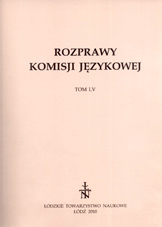Jednoznaczność i różnorodność osobowych form czasowników w Panu Balcerze w Brazylii Marii Konopnickiej
Explicitness and diversity of personal verb forms in Maria Konopnicka’s Pan Balcer w Brazylii
Author(s): Alina KępińskaSubject(s): Language and Literature Studies
Published by: Łódzkie Towarzystwo Naukowe
Summary/Abstract: The paper deals with various inflectional verb forms used in Maria Konopnicka’s epic poem Pan Balcer w Brazylii (Mr Balcer in Brazil). The inflectional diversity is beneficial for the versification and is used for rhyme and rhythm purposes. Moreover, it does not distort communicativeness as each of the variously expressed categories is explicit and thoroughly clear. The analysis reveals that certain common endings are distinguished in various tenses and moods, for instance the Old Slavonic 1st person plural -m, which is numerously exemplified in forms such as idziem, widzim, neighbours with idziemy, widzimy and in dialectal examples with the -maand -wa ending, e.g.: chcema, będziewa. The -m ending is also used in the poem in the past tense next to other forms, cf.: chodzilim and my chodzili, chodzilimy, myśmy chodzili, chodziliśmy. As an exception the ending is also used in the analytical form of the imperative: niechże świecim. In the 1st person plural of the imperative there are also general Polish forms such as idźmy, wracajmy and dialectal ones – often with the -ma ending (e.g.: dajma, idźma, lećma, śpieszma się) and other ones with a rare -wa ending, e.g.: jedźwa.
Journal: Rozprawy Komisji Językowej
- Issue Year: 2010
- Issue No: 55
- Page Range: 97-119
- Page Count: 23
- Language: Polish

